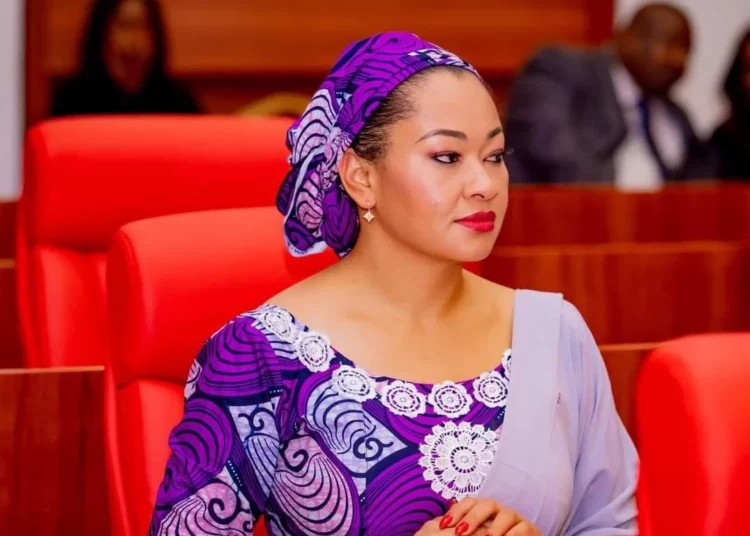A new twist—although largely expected—was added to the Senators Akpabio-Natasha controversy with the attempt to recall the Kogi lawmaker. Some persons were reported to have sent a petition to the Independent National Electoral Commission (INEC) seeking to recall embattled Senator Natasha Akpoti-Uduaghan representing Kogi Central district.
The petitioners accused the lawmaker of gross misconduct, “abuse of office, evasion of due process and a pattern of deceitful behavior that has not only embarrassed the people of Kogi Central constituency but has also tarnished the integrity of the Nigerian Senate and our nation’s democratic institutions.”
Despite these accusations by the petitioners, a feeling persists that those behind the petition may be doing a hatchet job. Regardless, the Senator maintains that she was suspended from the Senate because she raised an allegation of sexual harassment against the leader of the upper chamber,
Unfortunately, it is proving a herculean task to disabuse the minds of most Nigerians of this widely held notion. It is also worrisome that a gender argument is emerging forcefully, with some asserting that she is being hounded on that score. Should those seeking to recall Natasha have their way, the number of women in the National Assembly would have been reduced by one.
If the petitioners succeed in their challenge, that would deal a heavy blow to the much-talked-about gender inclusion, especially as it pertains to providing opportunities for women in elective offices.
Representation in Nigeria’s National Assembly, as it is with election into executive offices, has been skewed in favour of men. From 1999 to date, the number of women elected into the National Assembly has been a fraction of their male counterparts, making the clamour for more opportunities for women to ascend to elective offices a necessity.
For instance, 16 women were elected into the National Assembly in 1999–13 in the House of Representatives and three in the Senate. In 2003, the nation elected 25 women into the two chambers, comprising 21 and four for the House and the Senate, respectively.
During the 2007 election cycle, 36 women were elected into the National Assembly—27 in the House and nine in the Senate. This number was the highest in the history of female representation in the federal legislative arm because it dropped to 32 in 2011. In the 2015 election cycle, it was 29 and 17 in 2019.
Amid the calls for a gender-balanced parliament, the calls for more elective offices for women have intensified. It is under this atmosphere and against all odds that Senator Natasha and three others—Ireti Kingibe, Ipalibo Banigo and Idiat Oluranti were elected into the 10th senate.
The move to recall the embattled lawmaker, who has approached the court and is also facing the Senate Ethics Committee, which is currently investigating her petition against the Senate president, has everything to do with her issues with both the Senate as an institution and the Senate president and perhaps little or nothing to do with representation.
Will the move to recall Senator Natasha scale through? Although the Nigerian Constitution made explicit provisions in sections 69 and 110 for the recall of members of the National Assembly and State Houses of Assembly, successfully undertaking a recall is difficult. From 1999 to date, there has not been a single case of a successful recall.
In the recent past, some constituents have threatened to recall their representatives, and the move often ends with threats, nothing more. For instance, some aggrieved residents of Kaura Namoda/Birnin Magaji federal constituency of Zamfara State last year made a futile attempt to recall Hon Aminu Sani Jaji following his suspension by the APC ward executives and ratification by the local government and state working committee. The move was aborted along the way.
A similar scenario played out when some youths from Ondo state threatened to recall the member from Akure South and North constituency in the House of Representatives, Derin Abiodun Adesida, for alleged poor performance. That, too, never saw the light of day. Will Natasha’s be any different?
Section 69 of the 1999 Constitution of the Federal Republic of Nigeria (as amended), which provides for the recall process, allows for a multi-stage process involving the participation of the constituents, INEC, and the National Assembly in the event of the recall of a senator or House of Representatives member.
There is no contesting the fact that constituents from Kogi Central Senatorial district are at liberty to test this, but we plead that they allow reason to prevail.
Sadly, as is always the case, reason hardly prevails in high-wired politics, the type Senator Natasha is confronted with. Dealing with the former Governor Yahaya Bello and the incumbent Governor at the home front and the entire Senate at the national level, the Senator from Kogi Central has an uphill task to surmount.





